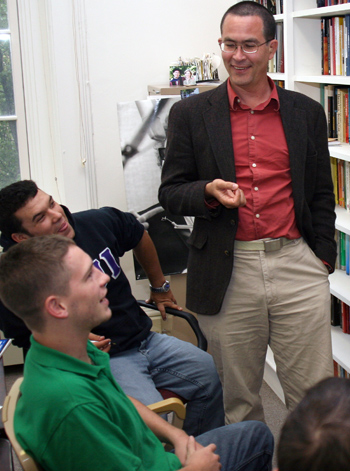Few living figures enjoy as much mythical status as Bob Dylan.
The celebrated troubadour, who's released dozens of influential albums spanning five decades, serves as a generational icon to those whose formative years were during the turbulent '60s and early '70s. His mastery of several musical genres - from folk to rock - has all but defined much of popular music. Over the years, his befuddling and often contradictory statements in interviews has only added to his mystique.
 Stephen Webb, a professor of religion and philosophy at Wabash College, thinks he has Dylan figured out. He lays it out in his latest book, "Dylan Redeemed," out now from Continuum Publishing and available in the Wabash College Bookstore.
Stephen Webb, a professor of religion and philosophy at Wabash College, thinks he has Dylan figured out. He lays it out in his latest book, "Dylan Redeemed," out now from Continuum Publishing and available in the Wabash College Bookstore.
Dylan is almost universally known as this radical protest singer and poetic champion of liberal causes. Webb thinks otherwise, writing that Dylan's body of work is more reflective of Christian thought, and cites several examples in his book.
It was at the end of a 1978 tour when Dylan announced he was a born-again Christian. In 1979 he issued the gospel-steeped "Slow Train Coming." For Webb, that was the record that changed his life.
"It was so powerful, and I still think it's just the most powerful album," he says.
Dylan subsequently released two more Christian records, 1980's "Saved" and 1981's "Shot of Love," before returning to his secular roots. Because they predate contemporary Christian music and are considered out of step with the rest of Dylan's canon, Webb says these three albums "kind of disappeared down this rabbit hole."
"Many of his albums since those three have had a lot of Christian content," Webb says. "But those were certainly the three that stood out. And all three still stand up pretty well today."
Webb rediscovered Dylan and his music with 1997's "Time Out of Mind."
"That got me interested in his career again," he said. "I hadn't been able to listen to those three Christian albums for some years, because they are so powerful. They took me back too quickly to my evangelical religious roots."
He started listening to Dylan's earlier work. What he found was that Dylan doesn't really fit the reformist, iconoclastic labels so many commentators have given him over the years.
"I'm always amazed by how homogenized our view of radicals is," Webb said. "People can be radical without being liberal. You challenge status quo from the right as well as the left. But somehow, beginning in the '70s and '80s, cultural and political liberals began monopolizing this idea that conservatives are bland, supporters of everything in the past. It's only liberals who are forward-thinking and willing to question things. So you have people like Dylan being put in a liberal box because people can't imagine that a conservative could be challenging. People just assumed since he was a provocative and challenging figure, and very much a kind of moralistic poet, that he must've been liberal and progressive on social and political issues. But he wasn't.
"And he's someone who doesn't think human nature changes much. That's a conservative position. If you think human nature stays the same - that we can't solve the problems of human nature; we have to endure them, live with them, and politics aren't going to save us from human sin - in general terms that's what it means to be conservative."
If you think of Dylan this way, it's easier to understand his religious conversion.
In his autobiography, "Chronicles, Volume One," Dylan wrote that Barry Goldwater - the 1964 Republican nominee for president who railed against New Deal social engineering - was his favorite politician. It's one of his many quirky and unexpected insights that Webb says most people don't take seriously.
 Coggeshall is a reporter for the Crawfordsville Journal Review. A longer version of this story appeared in the Dec. 20th issue. Click here to go to the full version.
Coggeshall is a reporter for the Crawfordsville Journal Review. A longer version of this story appeared in the Dec. 20th issue. Click here to go to the full version.